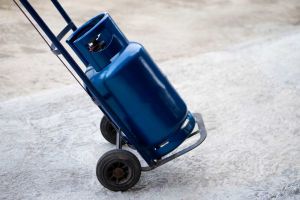Heaters can be an absolute game changer on those cold mornings when getting out of bed seems almost impossible. However, if not used safely, these appliances can lead to some pretty nasty health and safety concerns. Particularly with heaters powered by natural gas or LPG, there is an associated risk of carbon monoxide poisoning and even small house fires if these types of heaters are used incorrectly.
But is there a way to use these kinds of heaters safely in the home? Before you haphazardly throw away all your LPG-powered heaters, we’ve outlined everything you need to know about these kinds of heaters below. We’ve also included some tips on how to use your LPG heater safely and what might happen if you don’t.
On this page:
What is an LPG heater?
An LPG heater is a space heater that uses LPG (Liquified Petroleum Gas) for indoor or outdoor heating. Generally, these heaters come in one of two types: flued or unflued. A flued heater features a chimney or flue, which allows the heater to expel air pollutants and water vapour out of the home.
Unflued gas heaters (also known as portable heaters), however, are missing this chimney or flue feature, meaning that any air pollutants from the heating system are typically left within the home. Because of this, ventilation is key for homes with unflued gas heaters to ensure that anything emitted does not build up in the home.
If you are unsure what kind of gas heater you may have in your home, your owner’s manual should be able to highlight this as well as any instructions from the manufacturer around ventilation and safe usage.
How do LPG heaters work?
LPG heaters use an igniter (known as a piezoelectric igniter) to heat the LPG distributed within the heater. This is done through a hammer-like mechanism that strikes to create a spark.
Heat is then distributed, usually through a porcelain element that spreads the flame out in a pattern that is ideal for this function. Most heaters have a controllable temperature gauge, with the simplest being a choice between high or low and fancier heaters having a thermostat for more specific control.
What are the risks associated with LPG heaters?
The main risks associated with LPG heaters are carbon monoxide emissions and the potential for a fire or explosion. This is because LPG is a combustible fuel, that is how the heat is created, and so if there are any leaks, limited ventilation or the appliance is faulty then you might be in trouble.
Carbon monoxide is a serious concern. It is naturally odorless and colourless – meaning you cannot see or smell it, making it extremely hard to detect. But, while the gas is hard to detect, its side effects aren’t. People affected by carbon monoxide can get seriously sick or even die. Some of the symptoms of carbon monoxide poisoning include:

- Dizziness
- Feeling sick or nauseated
- Headaches
- Only feeling unwell whilst in the home
- Members of the family (both human and pets) getting sick at the same time.
If you experience any of these symptoms while using a gas appliance you should shut it off immediately and get out of the house so you can breathe fresh air. Do not resume using the appliance until a professional gas fitter has checked it out. And, if you suspect you may be experiencing carbon monoxide poisoning, it is best to seek medical attention immediately.
A properly functioning gas heater should produce little-to-no carbon monoxide, so ensuring that your appliance is maintained correctly is crucial. It is recommended to have your heater serviced by a professional at least once every two years, just to make sure it is working as it should.
House fires are also a concern if appliances, particularly heaters, are used incorrectly. Gas heaters are extremely flammable, which means that if something is placed on top or if there is a leak in the tank, there is a risk of causing a house fire. This is why it is important to use your heater properly and follow the manufacturer’s instructions.
Can you use outdoor heaters inside?
No, it is not safe to use an outdoor LPG heater, or any kind of outdoor heater for that matter, indoors. There are extremely different requirements for manufacturers when it comes to indoor and outdoor heaters: for example, indoor heaters must be able to function safely in a fully enclosed space, whereas outdoor heaters have access to unrestricted ventilation.
Indoor heaters are designed to minimise the production of carbon monoxide and are also intended to be used in smaller, enclosed spaces. In comparison, outdoor heaters, such as patio heaters, are intended to project their heat over a large area.
Australia has some of the strictest standards on gas appliance combustion emissions of any country in the world. This means that indoor heaters are very safe to use, as they must meet or surpass these standards. Outdoor heaters, however, do not have these same standards.
You might also be interested in:
Can you use gas heaters overnight?
It is not recommended that you leave a heater on for long periods of time or overnight. Whilst most heaters produce minimal to no carbon monoxide, when left on for long periods of time these emissions could build up and surpass the safe level. And, because you would be asleep, there would be no way of detecting this and turning the heater off.
Not to mention, if there are any other issues (such as a fire), by the time it woke you it might be too late to do anything about it. Having gas heaters on for long periods of time or overnight could also increase dry skin, allergies, or cause irritation to your eyes and skin.
Gas Heater Safety Tips
So, what can you do to ensure you are using your home gas heater as safely as possible? We’ve listed some of the key tips below:
- Keep children and pets away from the gas heater
- Do not place items such as clothing, blankets or towels over the top of the heater
- Service your appliance regularly – it is generally recommended to have a professional service at least once every two years
- Ensure that there hasn’t been a safety alert or recall issued for your gas heater
- Don’t use a kitchen rangehood or exhaust fan at the same time as your gas heater. Using these appliances can result in a negative pressure environment, where carbon monoxide could be drawn into living spaces
- Install a carbon monoxide detector (if concerned)
- Do not use portable outdoor gas appliances inside
- Keep heaters away from anything flammable.
Are LPG heaters safe to use?
LPG heaters are safe to use if, you maintain your appliance and use it as it was intended. If you are ever in doubt about your gas heater however, it is best to seek a professional opinion and follow their recommendations. You should always follow any safety guidelines set out in your user’s manual because the consequences are by no means minimal.
If you’re still tossing up on which heater will be best for use in your home, be sure to check out our gas heater vs electric heater comparison below. Here we discuss the pros and cons involved with using each type of heater and reveal which may be more energy efficient for you in the long run.
Gas vs Electric Heaters: Which is Best?
Image credit: BilalKhan93/Shutterstock.com, tawanroong/Shutterstock.com



Share this article